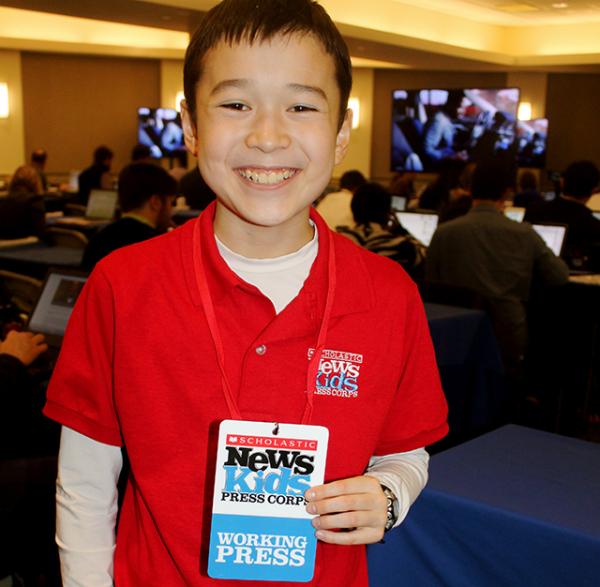KID REPORTERS’ NOTEBOOK
Clinton and Sanders Debate in New Hampshire


Max covers the debate at the University of New Hampshire in Durham.
On February 4, the first one-on-one debate between Democratic candidates Hillary Clinton and Bernie Sanders took place at the University of New Hamphsire in Durham. After the Iowa Caucus last week, former Maryland Governor Martin O’Malley dropped out of the race. Clinton beat Sanders by a narrow margin in Iowa, with O'Malley trailing far behind. Now Clinton heads into New Hampshire's February 9 primary as the underdog.
The debate provided a valuable opportunity for voters to learn more about the key differences between Clinton and Sanders. I joined members of the press in the Media Room to report on the debate, which was in a separate building on campus. Reporters sat at long tables in front of their laptops, with lots of big TV screens on the walls. As everyone focused on the debate, I took notes with a pencil and a spiral notebook.
I sat next to Teddy Davis, who serves as a reporter for CNN in Los Angeles. I asked him what he thought was important for kids to know about presidential elections. “I believe it’s important for kids to get involved early, and learn the process," he said. "Many do not realize how open the process is.” He had good advice for me, too. He said, “Follow the campaign closely so that you know when you hear something new.”
HELPING "ORDINARY" PEOPLE
Clinton and Sanders started off talking about their mutual respect for each other. But as the debate continued, their discussion became more heated. They are both progressive, they said, but they differed about their definition of that term. “A progressive is someone who makes progress," Clinton said. "That’s what I intend to do." She criticized Sanders’s policy ideas as unrealistic and unworkable. Sanders said that free universities and single-payer health care programs work in other countries and can work in the United States. “The middle class bailed out Wall Street in their time of need," he said. "Now, it is Wall Street’s time to help the middle class.”
Sanders described himself as the only candidate for “ordinary Americans” and the only one without a super pac [a group of corporations and others that can raise unlimited funds for a candidate]. He raised more than $3.5 million from supporters who gave an average of $27. His plan for winning the presidential election, he said, is to get more young people and working people voting.
Clinton separated herself from the “establishment” by pointing out that she is a woman running to be the first female president. She also defended the high speaking fees she commands from Wall Street banks and others, saying, “You will not find that I ever changed a view or a vote because of any donation that I ever received.”
As the candidates noted, Sanders has gained a lot of experience with veterans' affairs while working in the U.S. Senate, while Clinton, a former Secretary of State under President Barack Obama, has a deep knowledge of foreign policy. At the end, the question was asked whether each one would choose the other as vice president. Clinton said that if she were elected President, Sanders would be the first one she called to discuss how to move the country forward. Sanders said, “On our worst days, we are better than any Republican candidate.”
I certainly learned a lot about the Democratic candidates during the 90-minute debate. I also enjoyed talking politics with the other reporters. Jennie Matthew, a New York correspondent for AFP, an international newspaper, said, “Get out there, write, and tell the world.”
